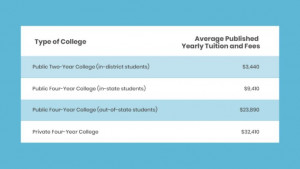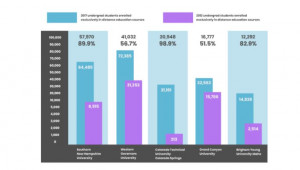Best Online Colleges in New York for 2024
Get detailed info on Best Online Colleges in New York and their online degrees, financial aid and scholarships, acceptance rate, tuition and fees.
The Best Community Colleges in New York
Get detailed information about the best community colleges in New York and their tuition cost, enrollment numbers, available credits, scholarships, and much more.
If you’re thinking about going to community college, congratulations!
Attending community college is an excellent way to jumpstart your education without breaking the bank, take some continuing education credits, learn a new skill or hobby, or even get a whole separate degree.
Before you can start your degree program, however, you have to decide what school you want to attend.
In this article, we’ll walk you through the best community colleges in New York. We’ll also talk about what to look for in a school and what benefits community colleges have over traditional universities.
Let’s dive in.
Community college vs. a university
Let’s take a look at the difference between a community college and a traditional four-year university.
Ultimately, the main difference between community colleges and universities is that most degrees in the community college environment take just two years to complete. Degrees at a four-year university, meanwhile, usually take four years to complete.
When students attend a four-year university, they often spend the first two years of their education taking general education requirements like math, history, and liberal arts courses.
All students do this regardless of what they want to study later. In fact, students in most four-year programs often do not even get into the “meat” of their chosen courses until the third year of their studies.
As such, students who want to streamline their education may choose to do the first two years of general education requirements in a community college environment first before transferring to a four-year college.
In most cases, the general education courses taken at a community college will transfer into a four-year university, allowing students to get a headstart on their degree. Students who begin their studies at a community college usually enter a university at the junior level, meaning they only need two additional years of study to obtain a degree.
Another thing that separates community colleges from universities is the accessibility of the courses.
While public universities usually offer adult education or continuing education courses, the prices tend to be much steeper than those offered at a community college.
Community colleges also offer a smaller campus size and additional study options like certificates and associate degrees.
What about vocational schools?
While community colleges and vocational schools share some similarities, they are not the same thing. Community colleges offer a wide array of topics and programs to study, while vocational schools focus on one specific skill.
Examples include auto-repair schools, culinary institutes, or plumbing and electrical programs.
Students typically graduate from these programs with an associate degree or certificate in their chosen field.
10 tips for finding the right community college
Finding the right degree program for you requires some due diligence. Follow these tips to find the correct certificate program or online associate option for you:
1. Check the school’s average tuition fees
Budget is an important consideration for anyone shopping for an online learning opportunity.
While community colleges tend to be more affordable than four-year universities, the average tuition between various community colleges can vary widely.
With that in mind, be sure to shop around for a program that suits your budget and financial requirements. If you want to offset the costs, you can also check out scholarships and other financial aid options, such as grants or loans.
2. Consider the school’s course options
Ultimately, the best school for you is the one that offers the classes you want to take.
Since most community colleges offer a wide selection of available courses, take your time combing through their course catalogs. Make sure the school offers the courses you’re interested in at times that will work for you.
If the course requires prerequisites, make sure you have or can obtain the needed courses before you enroll.
3. Check the school’s education statistics
Before you decide to enroll in a community college, search for stats like enrollment numbers, cost-per-credit, and graduation rate.
You’ll also want to check out education statistics, like the total number of programs available and required GED scores.
4. Look for online associate options
If you’re interested in studying virtually, look for a college that offers an online associate option.
An online program is an excellent option for anyone seeking a flexible schedule that can accommodate a full-time job, family responsibilities, or other commitments.
Plus, online education has become more popular in recent years, so you’ll be in good company.
5. Speak to a faculty member
As a prospective student, you’ll want to learn as much as you can about the community college you’re interested in attending. This is true whether you’re attending a technical college, seeking out a nursing program, or pursuing any other type of degree.
If you can, meet with a faculty member or another student to learn about the program and the courses offered.
6. Learn about admission requirements
Different community college academic programs have different admission requirements. As such, make sure to do your due diligence before you apply.
Learn about the admission requirements of the college you’re interested in. Pay special attention to things like testing requirements, required GED or SAT scores, and prerequisite courses required for your desired course of study.
7. Consider sitting in on a class
Most community colleges allow prospective students to sit in on a class if they’re considering registering. Go to the registrar’s office to learn more about audit opportunities and to browse a list of classes available.
Sitting in on a course is a great way to get a feel for the school, the faculty, and the other students in the program.
8. Consider industry options
If you want to go into a highly specialized field like nursing, plumbing, or auto repair, consider attending a vocational or technical school instead of a community college.
Vocational schools may streamline the educational path for professionals who know what they want to be and are anxious to get to work in their chosen industry.
9. Talk to an advisor
Once you’ve found a college you like, schedule a meeting with an academic advisor. The advisor will help you learn more about the program, its requirements, and its timeline.
The advisor is also an excellent resource for getting answers to your questions, sorting out financial aid options, and more.
10. Consider transfer options
If you intend to transfer after community college, make sure the college you attend has a transfer agreement with your chosen university. This promises your credits will transfer and that you won’t lose any course hours in the process.
A note on accreditation
If you’re planning to attend a community college, you can’t afford to overlook the importance of accreditation.
At the community college level, just like the university level, accreditation is a good indicator of quality. This is because accredited schools must comply with standards established by accreditation agencies.
Getting a diploma or degree from an accredited school also frees you up to transfer to a four-year college or university later, if that’s the path you choose to pursue.
Top community colleges in New York
Whether you’re an international student looking for a liberal arts program or a pre-med student seeking a nursing program, these New York community colleges are a great place to study.
Browse our list of the top options below:

Christian Leadership University
Cheektowaga, New York
Institution Type: Private Not-For-Profit
Financial Aid Percentage: Request Info
Average Financial Aid: Request Info
Acceptance Rate: Request Info
Total Programs Offered (90)
90
Theology Programs
LIU Post
Brookville, New York
Institution Type: Private Not-For-Profit
Financial Aid Percentage: 94%
Average Financial Aid: $21,178
Acceptance Rate: 81.00
Total Programs Offered (17)
6
Science Programs
2
Nursing Programs
2
Education Programs
7
Other Programs

Teachers College of Columbia University
New York, New York
Institution Type: Private Not-For-Profit
Financial Aid Percentage: Request Info
Average Financial Aid: Request Info
Acceptance Rate: Request Info
Total Programs Offered (5)
3
Nursing Programs
1
Computer Science Program
1
Health Science Program

Yeshiva University
New York, New York
Institution Type: Private Not-For-Profit
Financial Aid Percentage: 84%
Average Financial Aid: $26,387
Acceptance Rate: 51.00
Total Programs Offered (4)
2
Business Management Programs
1
Human Services Program
1
Computer Science Program
State University of New York (SUNY) at Delhi
Delhi, New York
Institution Type: Public
Financial Aid Percentage: 80%
Average Financial Aid: $8,195
Acceptance Rate: 51.00
Total Programs Offered (8)
3
Business Management Programs
3
Nursing Programs
1
Criminal Justice Program
1
Other Program

Herkimer College
Herkimer, New York
Institution Type: Private Not-For-Profit
Financial Aid Percentage: 81%
Average Financial Aid: $5,781
Acceptance Rate: Request Info
Total Programs Offered (28)
11
Business Management Programs
3
Criminal Justice Programs
3
Health Science Programs
11
Other Programs
Farmingdale State College (SUNY)
Farmingdale, New York
Institution Type: Public
Financial Aid Percentage: 53%
Average Financial Aid: $6,593
Acceptance Rate: 58.00
Total Programs Offered (1)
1
Health Science Program
The College of Saint Rose
Albany, New York
Institution Type: Private Not-For-Profit
Financial Aid Percentage: 99%
Average Financial Aid: $20,747
Acceptance Rate: 84.00
Total Programs Offered (3)
1
Information Technology Program
1
Computer Science Program
1
Education Program
St. Josephs College-Long Island
Patchogue, New York
Institution Type: Private Not-For-Profit
Financial Aid Percentage: Request Info
Average Financial Aid: Request Info
Acceptance Rate: Request Info
Total Programs Offered (27)
7
Business Management Programs
5
Education Programs
4
Behavioral Sciences Programs
11
Other Programs

Empire State College (ESC)
Saratoga Springs, New York
Institution Type: Public
Financial Aid Percentage: 87%
Average Financial Aid: $7,187
Acceptance Rate: Request Info
Total Programs Offered (36)
12
Business Management Programs
7
Education Programs
3
Public Administration Programs
14
Other Programs
Conclusion
If you’re looking for an online associate degree that fits your budget, schedule, and preferences, then a community college could be the perfect option for you.
The College Monk is here to help you navigate the world of community colleges in New York and around the country.
Check out our website to learn more about community colleges, online college options, tuition costs, scholarships, and more.

